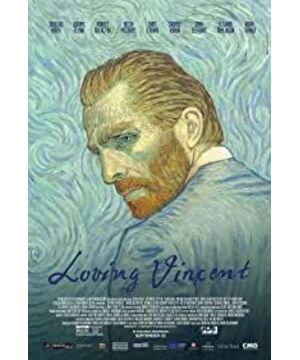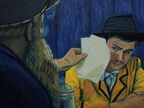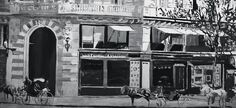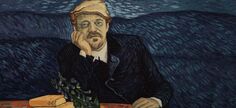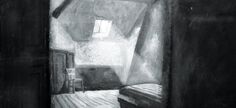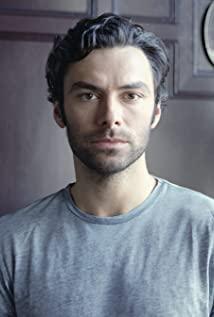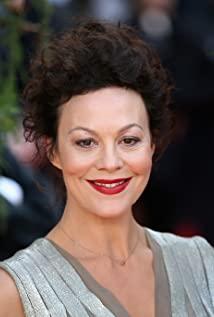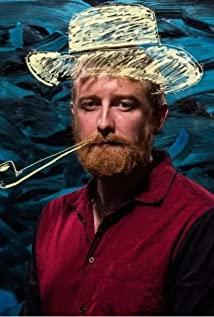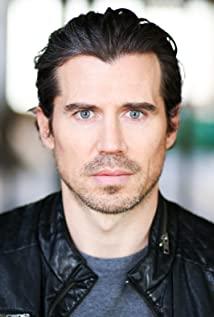Note: basic borrowing to play. The man was empty-handed; he put his hands on his stomach, where there was a fresh gunshot wound and blood was still oozing. He was Vincent van Gogh, who was unknown when he died, but is now a world-famous artist. The man was carrying nothing; his hands clasped to a fresh bullet wound leaking blood from his belly. This was Vincent van Gogh, then a little known artist; now the most famous artist in the world. On the official website of the film, two sentences were written in the introduction of Van Gogh's life. We all know that there are countless works that tell the story of Van Gogh's life. He may not be the world's greatest painter, nor the world's most unfortunate painter, but to combine the two, few have had such ups and downs. His talent was buried while he was alive, and his glory can only be piled in front of the tomb today. No one is more suited to the screen than him. Compared with all the previous works, the biggest contribution of "Love Van Gogh" is precisely to make Van Gogh's paintings move on the screen. Although the paintings used in the film are not from Van Gogh's original works, but are reproduced and recreated by other painters, for most viewers, this is probably a trivial difference. Even the thinness of the plot doesn't overshadow the film's stunning art form. This is of course a pioneering work, after all, there is nothing better than Van Gogh's own work to explain himself; there is nothing better than the medium of film, which can reflect the beauty of form. Every character in the film is a person who actually appeared in Van Gogh's life, and even became his muse and was fortunate enough to live in his paintings. The crew found a group of live actors, including Saoirse Ronan, Aidan Turner and other big names, to motion capture them. On the official website, you will find that everyone has a sentence of their own. Detective who catches the duck on the shelf: I don't see the point of delivering a letter to a dead person.
Struggling painter: One day, I will use my paintings to tell the world what kind of fire is burning inside this little person who no one cares about.
Weird Doctor: Two weeks later, I was sitting by his bedside, and he was dying, and the only thing he said to me, maybe that would be good for everyone.
The fickle doctor's daughter: People always think there are no secrets in the country. It must be another girl.
Clever Boatman: You can catch many lives here, if you can catch my rapids.
Seeing such a work, I can't help but ask myself, will this be a new beginning, and will we see more and better oil painting animations after this? Whether it is Van Gogh or many other equally amazing artists, there are still only a handful of masterpieces about them in history. Their paintings and their lives are worthy of being put on the screen, and worthy of admiration and commemoration. But in fact, let Van Gogh's paintings speak for themselves, this idea was already experimented by Alain Resnais in 1948. He aimed the camera at the great painter's painting, from start to finish. The edge as a maiden is as breath-taking as a Van Gogh painting. Unfortunately, this is a black and white documentary. For Van Gogh, the most fascinating thing about him is his imaginative brushstrokes and the colors that always seem to be burning. These can not be reflected in the documentary, it can be said that it is difficult for a clever woman to cook without rice. The plot of "Beloved Van Gogh" is basically based on the 800 letters of Van Gogh before his death, and most of them come from the correspondence between Van Gogh and his younger brother Theo. This idea is not without precedent. The BBC's 2010 documentary "Van Gogh: A Life in Paintings" aims to speak for Van Gogh. Every word spoken by the actors in the film comes from his own letters. This also makes this documentary endowed with even more precious meaning. After reading "Van Gogh: A Life in Painting and Speaking", you will find that the sharpness and beauty of Van Gogh's words can almost rival that of his brush. The actor who played Van Gogh in the documentary, Benedict Cumberbatch, had yet to gain huge fame and fortune because of "Sherlock". He spent ten years in British circles, and even narrowly escaped a rather terrifying robbery on a South African motorway. He must have a deep understanding of what it feels like to be unhappy. But fortunately, God rewards hard work, and his performance in the film is still beyond reproach. Not only did he show his excellent line skills, but the Van Gogh he played, a genius who was arrogant, arrogant, extremely aggressive, who was not understood by others and was almost disturbed by his talent, seemed to be also affected by his acting career. Repeated countless times. "Love Van Gogh" tells the story of Vincent van Gogh who lived in the Raoul Hotel in the French town of Auvers for six weeks before his death, until he came to the end of his life. Maurice Piara's "Van Gogh" also captures the last 67 days of the artist's life. Although this "Van Gogh" from the famous French director was nominated for the Palme d'Or, it is also a controversial one in its adaptations. Because Van Gogh in this movie is completely an ordinary person. He is taciturn, ruthless and selfish, lingering among the flesh of prostitutes and maidens , not the painter who is isolated from the world and fanatical about art in our impression. The film is slow-paced and not too rich in plot. It can almost be regarded as a record of French village life in the 19th century. As seen in the stills, Van Gogh's country life is bleak and plain, as if forever separated by a layer of misty dust, only his paintings remain so bright. If you compare "Van Gogh" and "Beloved Van Gogh", you will find that the people, things, and things in the same experience show completely different states. This subtle feeling is like lingering in different Van Gogh universes, looking at different Van Goghs, making different choices in the same situation, and finally heading towards the same end. That is death. After reading "Love Van Gogh" first, I made up for Piara's "Van Gogh" in turn. I am glad that I chose such an order. If it is reversed, there will probably be a stronger feeling of "being in trouble in the past". Beloved Van Gogh is like a love letter from Van Gogh's admirers to the painter. The film begins after Van Gogh's death, a young postman, thinking that he was delivering a letter, went back to the last place he lived, the Lau Hotel in Auvers, and chatted with every villager who came into contact with him, Trying to find out the truth about his death. Anyone could be a murderer: a doctor who was jealous of Van Gogh's talent, an innkeeper who had a gun and didn't seem to get along well, a frivolous rich boy, and a lunatic who suddenly appeared in a wheat field. Rather than chatting with them, the postman was digging pieces of the deceased out of their mouths. He is remembering the person who has passed away, and he is also making a belated judgment on these indifferent bystanders. Every fool who snubbed Vincent van Gogh before his death will regret it after his death. Everyone loves Van Gogh, and everyone treats Van Gogh wrong. "Love Van Gogh" is almost a detective movie, just as the postman's label is "the detective who catches ducks on the shelf", but he also fell in love with Van Gogh unknowingly. He is revisiting the old place, and once again awakening the ghost sleeping under the golden wheat field. As this film is all about, "in memory" of Van Gogh. By the end, the creators came up with a new theory: Van Gogh did not die by suicide. After all, why would a 37-year-old man who is full of vitality and at the peak of his creativity choose to interrupt his artistic career? They would rather believe that Van Gogh died of good will, just as Jesus did, gently covering up the faults of the world. However, such an argument is ultimately only vague. As Saoirse Ronan's character puts it: "You always want to know How he died, but do you know how he lived before he died? "The postman has no way of knowing. Because Van Gogh is dead, and he's been dead for too long. He was one of many who mistreated him before he died. Fortunately, it doesn't matter. The investigation into the death of Van Gogh is just to make Van Gogh live again, to make him a higher altar. The final destination of the film is not the truth, but the love for him. So far, only Pia is still the only one. La's "Van Gogh" clearly explained a problem: why did the artist die. In "Van Gogh", his death was almost without warning. In the last shot, he was still carefully wiping his body, He shaves in the mirror; in the next shot, you see this thin man clutching his bleeding stomach as he stumbles from the wheat field, before stepping on a train with his adoring teenage girl. She is young and beautiful, and is a budding flower. Picking such a heart is probably the most boastful work of all middle-aged artists, even Visconti is not spared. That's why he was in "Soulbreak Venice" Indulge in the beauty of the boy's form in "Indulgence, all philosophy, art, achievement, he left behind. He willingly bowed his head to Tacchio and kissed his toes. But that was not the case with Van Gogh. He remained moody. , at such a happiest moment, leaving the happy girl behind and sitting alone by the window in silence. At that moment, on the whizzing train, no one knew what he was thinking. It was as if he had been Too long in life, too long in worldly loves and desires, but he still knows that he can't get satisfaction from these things. How happy he looks, how unhappy he is. But he There is only silence, except for picking up the brush, there is only silence. Although this version of "Van Gogh" seems to pull the great painter down from the altar and describe him as a completely ordinary person; but writing this, I seem to I also suddenly understood why he chose to commit suicide. For the first time, I understood and agreed with his choice. I understood the shot he fired at himself, I understood his dying in the hospital bed, and I understood his decisiveness Cut off all the fetters of this world, love his brother, the girl who loves him, and the world who should love him. Because these do not belong to him. He sacrificed himself to the altar of art, so all the happiness and misfortune in the world , no longer belong to him. The fire in his heart has burned him to ashes. one of many. Fortunately it doesn't matter. This arduous death investigation is just to make Van Gogh live again, so that he can be enshrined on a higher altar. The final destination of the film is not the truth, but the love for him. So far, only Piara's "Van Gogh" has clearly explained one question: why the artist died. In "Van Gogh", his death is almost without warning. In the previous shot, he is still carefully wiping his body and shaving in front of the mirror; in the next shot, you can see this thin man clutching his bleeding abdomen and stumbled from the wheat field. Before that, he also set foot on a train with the girl who admired him. She is young and beautiful, a flower in bud. Picking such a heart is probably the most boastful work of all middle-aged artists, even Visconti is not immune. That's why he indulged in the beauty of the boy's appearance in "Soulbroken Venice", and all his philosophy, art, and achievements were left behind by him. He willingly bowed his head to Tacchio and kissed his toes. But that was not the case with Van Gogh. He was still moody, and at such a happiest moment, he left the happy girl behind and sat alone by the window in silence. At that moment, on the whizzing train, no one knew what he was thinking. It's as if he's been beaten for too long by life, too long in worldly loves and desires, but he still knows that he doesn't get satisfaction from these things. As happy as he looks, he is actually so unhappy. But he could only be silent, except for picking up the brush, there was only silence. Although this version of "Van Gogh" seems to pull the great painter down from the altar and describe him as a completely ordinary person; but writing this, I seem to suddenly understand why he chose to commit suicide. For the first time, I understood and agreed with his choice. I understand the shot he fired at him, I understand his dying breath on the hospital bed, I understand how he renounced all the bonds of this world, and loved his brother, the girl who loved him, and who should have loved him of the world. Because none of these belong to him. He sacrificed himself to the altar of art, so all the happiness and misfortune of the world no longer belonged to him. The fire in his heart had burned him to ashes. one of many. Fortunately it doesn't matter. This arduous death investigation is just to make Van Gogh live again, so that he can be enshrined on a higher altar. The final destination of the film is not the truth, but the love for him. So far, only Piara's "Van Gogh" has clearly explained one question: why the artist died. In "Van Gogh", his death is almost without warning. In the previous shot, he is still carefully wiping his body and shaving in front of the mirror; in the next shot, you can see this thin man clutching his bleeding abdomen and stumbled from the wheat field. Before that, he also set foot on a train with the girl who admired him. She is young and beautiful, a flower in bud. Picking such a heart is probably the most boastful work of all middle-aged artists, even Visconti is not immune. That's why he indulged in the beauty of the boy's appearance in "Soulbroken Venice", and all his philosophy, art, and achievements were left behind by him. He willingly bowed his head to Tacchio and kissed his toes. But that was not the case with Van Gogh. He was still moody, and at such a happiest moment, he left the happy girl behind and sat alone by the window in silence. At that moment, on the whizzing train, no one knew what he was thinking. It's as if he's been beaten for too long by life, too long in worldly loves and desires, but he still knows that he doesn't get satisfaction from these things. As happy as he looks, he is actually so unhappy. But he could only be silent, except for picking up the brush, there was only silence. Although this version of "Van Gogh" seems to pull the great painter down from the altar and describe him as a completely ordinary person; but writing this, I seem to suddenly understand why he chose to commit suicide. For the first time, I understood and agreed with his choice. I understand the shot he fired at him, I understand his dying breath on the hospital bed, I understand that he renounced all the ties of this world, and loved his brother, the girl who loved him, and who should have loved him of the world. Because none of these belong to him. He sacrificed himself to the altar of art, so all the happiness and misfortune of the world no longer belonged to him. The fire in his heart had burned him to ashes. In "Van Gogh", his death is almost without warning. In the previous shot, he is still carefully wiping his body and shaving in front of the mirror; in the next shot, you can see this thin man clutching his bleeding abdomen and stumbled from the wheat field. Before that, he also set foot on a train with the girl who admired him. She is young and beautiful, a flower in bud. Picking such a heart is probably the most boastful work of all middle-aged artists, even Visconti is not immune. That's why he indulged in the beauty of the boy's appearance in "Soulbroken Venice", and all his philosophy, art, and achievements were left behind by him. He willingly bowed his head to Tacchio and kissed his toes. But that was not the case with Van Gogh. He was still moody, and at such a happiest moment, he left the happy girl behind and sat alone by the window in silence. At that moment, on the whizzing train, no one knew what he was thinking. It's as if he's been beaten for too long by life, too long in worldly loves and desires, but he still knows that he doesn't get satisfaction from these things. As happy as he looks, he is actually so unhappy. But he could only be silent, except for picking up the brush, there was only silence. Although this version of "Van Gogh" seems to pull the great painter down from the altar and describe him as a completely ordinary person; but writing this, I seem to suddenly understand why he chose to commit suicide. For the first time, I understood and agreed with his choice. I understand the shot he fired at him, I understand his dying breath on the hospital bed, I understand how he renounced all the bonds of this world, and loved his brother, the girl who loved him, and who should have loved him of the world. Because none of these belong to him. He sacrificed himself to the altar of art, so all the happiness and misfortune of the world no longer belonged to him. The fire in his heart had burned him to ashes. In "Van Gogh", his death is almost without warning. In the previous shot, he is still carefully wiping his body and shaving in front of the mirror; in the next shot, you can see this thin man clutching his bleeding abdomen and stumbled from the wheat field. Before that, he also set foot on a train with the girl who admired him. She is young and beautiful, a flower in bud. Picking such a heart is probably the most boastful work of all middle-aged artists, even Visconti is not immune. That's why he indulged in the beauty of the boy's appearance in "Soulbroken Venice", and all his philosophy, art, and achievements were left behind by him. He willingly bowed his head to Tacchio and kissed his toes. But that was not the case with Van Gogh. He was still moody, and at such a happiest moment, he left the happy girl behind and sat alone by the window in silence. At that moment, on the whizzing train, no one knew what he was thinking. It's as if he's been beaten for too long by life, too long in worldly loves and desires, but he still knows that he doesn't get satisfaction from these things. As happy as he looks, he is actually so unhappy. But he could only be silent, except for picking up the brush, there was only silence. Although this version of "Van Gogh" seems to pull the great painter down from the altar and describe him as a completely ordinary person; but writing this, I seem to suddenly understand why he chose to commit suicide. For the first time, I understood and agreed with his choice. I understand the shot he fired at him, I understand his dying breath on the hospital bed, I understand how he renounced all the bonds of this world, and loved his brother, the girl who loved him, and who should have loved him of the world. Because none of these belong to him. He sacrificed himself to the altar of art, so all the happiness and misfortune of the world no longer belonged to him. The fire in his heart had burned him to ashes. Not so. He was still moody, and at such a happiest moment, he left the happy girl behind and sat alone by the window in silence. At that moment, on the whizzing train, no one knew what he was thinking. It's as if he's been beaten for too long by life, too long in worldly loves and desires, but he still knows that he doesn't get satisfaction from these things. As happy as he looks, he is actually so unhappy. But he could only be silent, except for picking up the brush, there was only silence. Although this version of "Van Gogh" seems to pull the great painter down from the altar and describe him as a completely ordinary person; but writing this, I seem to suddenly understand why he chose to commit suicide. For the first time, I understood and agreed with his choice. I understand the shot he fired at him, I understand his dying breath on the hospital bed, I understand how he renounced all the bonds of this world, and loved his brother, the girl who loved him, and who should have loved him of the world. Because none of these belong to him. He sacrificed himself to the altar of art, so all the happiness and misfortune of the world no longer belonged to him. The fire in his heart had burned him to ashes. Not so. He was still moody, and at such a happiest moment, he left the happy girl behind and sat alone by the window in silence. At that moment, on the whizzing train, no one knew what he was thinking. It's as if he's been beaten for too long by life, too long in worldly loves and desires, but he still knows that he doesn't get satisfaction from these things. As happy as he looks, he is actually so unhappy. But he could only be silent, except for picking up the brush, there was only silence. Although this version of "Van Gogh" seems to pull the great painter down from the altar and describe him as a completely ordinary person; but writing this, I seem to suddenly understand why he chose to commit suicide. For the first time, I understood and agreed with his choice. I understand the shot he fired at him, I understand his dying breath on the hospital bed, I understand that he renounced all the ties of this world, and loved his brother, the girl who loved him, and who should have loved him of the world. Because none of these belong to him. He sacrificed himself to the altar of art, so all the happiness and misfortune of the world no longer belonged to him. The fire in his heart had burned him to ashes.
View more about Loving Vincent reviews


